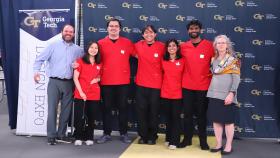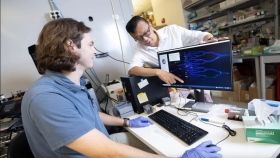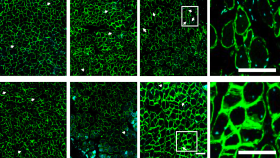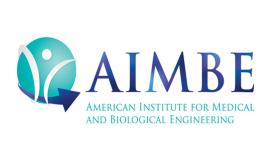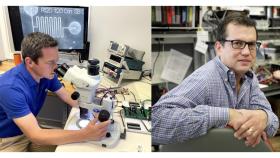For as long as she can remember, Karmella Ann Haynes has been intrigued in the sights and sounds of the real world, curious about how the universe works. It’s a global kind of curiosity that she satisfies with diverse skills and a focused passion, as an artist boldly depicting evocative Afro-imagery in oil paint, and most pointedly as a biomedical engineer on the leading edge of an emerging realm of research, chromatin engineering.
Haynes, assistant professor in the Wallace H. Coulter Department of Biomedical Engineering at Emory University and the Georgia Institute of Technology, researches chromatin, and how it can be used to control cell development in tissues. Her lab investigates and designs chromatin-based systems for controlling gene expression in cancer and other cells.
It's a research pursuit that is requiring the multi-talented Haynes to wear several different hats lately. Most recently, she played a key role in helping to chart a course for the future of research in engineering biology (also called ‘synthetic biology’), a field that involves taking what we know about the genetics of plants and animals and then tweaking specific genes to make these organisms do new things.
The 20-year-old field is mature enough now to provide solutions to many societal problems, according to a roadmap released on June 19 by the Engineering Biology Research Consortium (EBRC). This public-private partnership is partially funded by the National Science Foundation and centered at the University of California, Berkeley (UCB).
The roadmap is the work of more than 80 scientists and engineers from multiple disciplines, representing more than 30 universities and a dozen companies. Though highly technical, the report provides a strong case that the federal government should invest in this area, not only to improve public health, food crops, and the environment, but also to fuel the economy and maintain the country’s leadership in synthetic biology.
Haynes was a sub-group leader for the health and medicine sector of the roadmap.
“Over several months we met at a few workshops to develop the roadmap,” says Haynes, who joined the Coulter Department in 2018 after seven years at Arizona State (ASU), where she was an assistant professor of biomedical engineering and synthetic biology. “We expect that agencies such as the NSF and NIH will look to this guidance on what to expect from the synthetic biology community.”
For Haynes, this is an area of interest that goes back before her days at ASU, “to when I was a postdoc at Harvard, where I became interested in synthetic biology. I was not trained as an engineer, but I saw how engineering provided opportunities to do research that can have an immediate impact.”
She is currently working on research entitled “Predictable control of gene regulation through epigenetic engineering,” for which she hopes to receive NIH funding. Chromatin is the complex of DNA and proteins packed within the nucleus of mammalian cells, and chromatin engineering plays an important role in epigenetics and epigenetic engineering. This is a continuation of the work Haynes helped pioneer at ASU.
With this project, Haynes and her colleagues plan to explore fusion proteins that interact with the chromatin fiber, activating therapeutic genes at sites that bear patterns of cancer-related chromosome features that support inducible changes in gene expression states, and use protein engineering to identify determinants of nuclear protein engagement.
Current methods to reactivate dormant therapeutic genes in cancer cells are limited to inhibitors that bind epigenetic enzymes and other proteins, Haynes explains. Her work would seek to establish a new technology: customizable synthetic proteins that control anti-cancer genes near cancer-associated biochemical marks.
“We’re trying to tackle the challenge of effectively controlling big blocks of genes, like 100 genes at a time instead of going after one,” she says.
Meanwhile, Haynes is making an impact with her writing as well, having recently published a review article, relevant to the project, in Current Opinion in Systems Biology. The article, entitled “Chromatin Research and Biological Engineering: An evolving relationship poised for new biomedical impacts,” she explains, “is kind of a survey of all the relevant research happening in this area of research, which is truly interdisciplinary.”
Media Contact
Jerry Grillo
Communications Officer II
Parker H. Petit Institute for
Bioengineering and Bioscience



